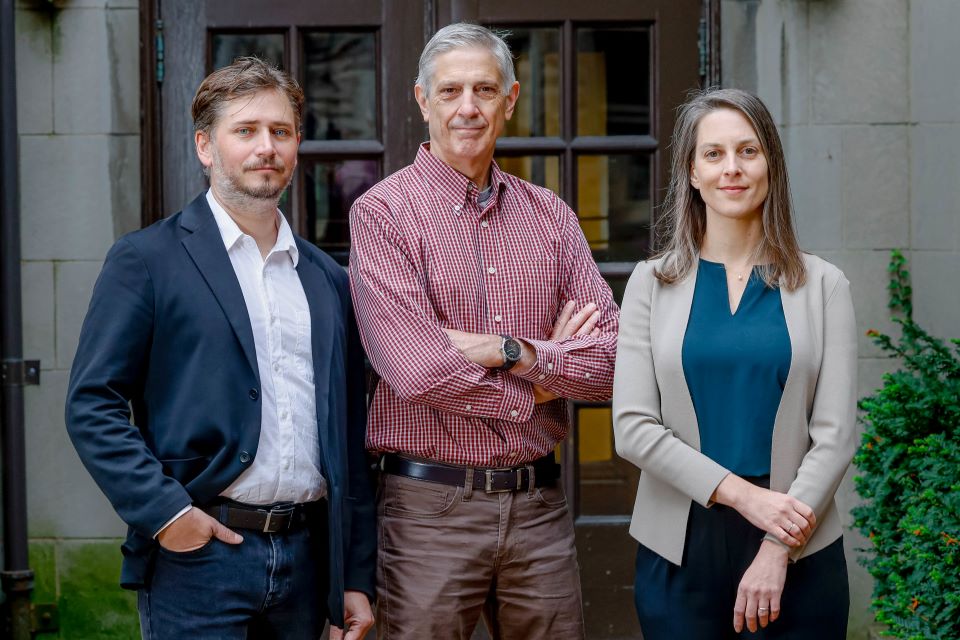SLU Researchers Receive NEH Grant to Fund 2023 Summer Institute on Early-Modern Globalization
Maggie Rotermund
Senior Media Relations Specialist
maggie.rotermund@slu.edu
314-977-8018
Reserved for members of the media.
ST. LOUIS – Three Saint Louis University researchers have been awarded a $219,641 grant through the National Endowment for the Humanities (NEH). The grant will fund a 2023 NEH Institute for Higher Education Faculty on the campus of Saint Louis University.
“Global Geographies of Knowledge: Creating, Representing, and Commodifying Ideas Across Early Modern Places, 1400–1800,” is a four-week residential institute for 30 higher education faculty on knowledge and globalization in the early modern period.
The project is led by Claire Gilbert, Ph.D., associate professor of history; Fabien Montcher, Ph.D., assistant professor of history; and Charles ‘Hal’ Parker, Ph.D., professor of history.
The Institute is one of 37 summer seminars, institutes and workshops for K-12 schoolteachers and college faculty funded in the NEH’s third round of grants for the fiscal year 2022.
“The goal is to transform how history is taught,” Montcher said. “Early modern history is often taught in a chronological linear way. We want to broaden perspectives on historical writing by thinking spatially about past and present experiences.”
The Institute intends to bridge the gap between innovative scholarship on the early modern period and traditional ways students encounter it in the classroom, Parker added.
Global Geographies will introduce college and university teachers to connected ways of thinking about the global facets of early modern history and strategies for incorporating them in their classrooms.
Gilbert said the time period (1400-1800) is really the first wave of globalization and learning more about this period can explain the way people live today.
The intensive four-week program will provide teachers with new methods and ideas for their existing world history courses, as well as create new syllabi, readings, and other materials for potential new courses. Each participant will work toward creating a project which will be presented to the full Institute at the end of the program.
Participants will have access to the Pius XII Rare Books Room, the Vatican Film and Manuscript Library and the Jesuit Archive and Research Center while at SLU. They will also utilize the St. Louis Art Museum, Missouri Botanical Garden’s Peter H. Raven Library and Herbarium and the Bernard Becker Medical Library at Washington University in St. Louis.
Invited faculty include Miles Ogborn, University of London; Karin Vélez, Macalester College; Julia Adams, Yale University; Heather Ferguson, Claremont McKenna College; Eileen Reeves, Princeton University; Ricardo Padron, University of Virginia; Benjamin Schmidt, University of Washington; and James Sweet, University of Wisconsin-Madison.
Gilbert, Montcher and Parker’s research expertise spans Europe, the Mediterranean Sea, Atlantic and Indian Oceans. Gilbert works in the history of translation and linguistics, with an emphasis on western Mediterranean interactions. Montcher works on the social history of knowledge and politics across the early modern Iberian worlds, and Parker’s research focuses on early modern Europe and world history.
Seminar Requirements
Seminars and Institutes are designed for a national audience of full- or part-time faculty who teach undergraduate students. SLU-affiliated faculty and staff cannot participate in an Institute hosted by the University. The application period opens Dec. 1, 2022.
The Global Geographies of Knowledge Project has been made possible in part by the National Endowment for the Humanities: Democracy demands wisdom.
National Endowment for the Humanities
Created in 1965 as an independent federal agency, the National Endowment for the Humanities supports research and learning in history, literature, philosophy, and other areas of the humanities by funding selected, peer-reviewed proposals from around the nation. Additional information about the National Endowment for the Humanities and its grant programs is available at www.neh.gov.


















